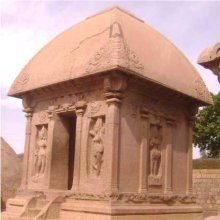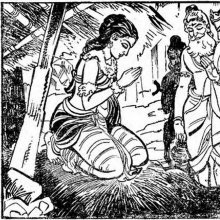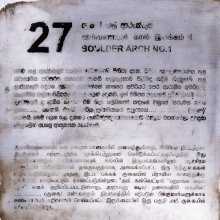Hut: 6 definitions
Introduction:
Hut means something in Hinduism, Sanskrit, Hindi. If you want to know the exact meaning, history, etymology or English translation of this term then check out the descriptions on this page. Add your comment or reference to a book if you want to contribute to this summary article.
Images (photo gallery)
In Hinduism
Vastushastra (architecture)
Source: Shodhganga: Elements of Art and Architecture in the Trtiyakhanda of the Visnudharmottarapurana (vastu)Small Huts are denoted by the Sanskrit term Kūṭa, which in ancient Indian architecture refers to a specific part of the Temple, according to the Viṣṇudharmottarapurāṇa, an ancient Sanskrit text which (being encyclopedic in nature) deals with a variety of cultural topics such as arts, architecture, music, grammar and astronomy.—Kūṭa means the top portion of a building which is situated on the kaṭi i.e., the hip part of the temple. According to the Śabdakalpadruma, kuṭa means small hut. Actually in Hindu temple architecture, small huts in particular shapes are seen to be constructed above the kaṭi portion of a temple.

Vastushastra (वास्तुशास्त्र, vāstuśāstra) refers to the ancient Indian science (shastra) of architecture (vastu), dealing with topics such architecture, sculpture, town-building, fort building and various other constructions. Vastu also deals with the philosophy of the architectural relation with the cosmic universe.
Languages of India and abroad
Sanskrit dictionary
Source: Cologne Digital Sanskrit Dictionaries: Cappeller Sanskrit-English DictionaryHut (हुत्).—(—°) offering, sacrificing.
Source: Cologne Digital Sanskrit Dictionaries: Monier-Williams Sanskrit-English DictionaryHut (हुत्):—[from hu] mfn. sacrificing (ifc.; See agni-h etc.)
[Sanskrit to German]
Sanskrit, also spelled संस्कृतम् (saṃskṛtam), is an ancient language of India commonly seen as the grandmother of the Indo-European language family (even English!). Closely allied with Prakrit and Pali, Sanskrit is more exhaustive in both grammar and terms and has the most extensive collection of literature in the world, greatly surpassing its sister-languages Greek and Latin.
Hindi dictionary
Source: DDSA: A practical Hindi-English dictionaryHut in Hindi refers in English to:—(a) thrown into fire (as an oblation); sacrified..—hut (हुत) is alternatively transliterated as Huta.
...
Nepali dictionary
Source: unoes: Nepali-English DictionaryHut is another spelling for हुत [huta].—adj. offered as an oblation to fire; burnt as a sacrificial offering;
Nepali is the primary language of the Nepalese people counting almost 20 million native speakers. The country of Nepal is situated in the Himalaya mountain range to the north of India.
See also (Relevant definitions)
Starts with (+9): Huta, Hutabhaga, Hutabhaksha, Hutabhojana, Hutabhoktri, Hutabhugbhaya, Hutabhugdhvaja, Hutabhugdish, Hutabhugvinetra, Hutabhuj, Hutabhukpriya, Hutad, Hutagni, Hutahoma, Hutajatavedas, Hutasamvikta, Hutasha, Hutashana, Hutashani, Hutashesha.
Query error!
Full-text (+399): Kuti, Kutira, Utaja, Parnakuti, Yajnahut, Parnotaja, Agnihut, Mathika, Kayamana, Sahotaja, Parnashala, Kutika, Agnihotrahut, Kota, Kotaka, Trinakuti, Mayata, Sarvahut, Kutiraka, Ganja.
Relevant text
Search found 219 books and stories containing Hut, Huts; (plurals include: Huts, Hutses). You can also click to the full overview containing English textual excerpts. Below are direct links for the most relevant articles:
Trishashti Shalaka Purusha Caritra (by Helen M. Johnson)
Part 3: Mahāvīra’s stay at Morāka < [Chapter III - Mahāvīra’s first six years as an ascetic]
Part 2: The first incarnation of Ṛṣabha as the merchant Dhana < [Chapter I]
Part 2: Description of Ayodhyā < [Chapter II - Abhinandanacaritra]
The Bhikkhus Rules (by Bhikkhu Ariyesako)
Luxurious Lodgings < [Chapter 3 - Possessions And Offerings]
Stealing < [Chapter 3 - Possessions And Offerings]
Hiranyakesi-grihya-sutra (by Hermann Oldenberg)
Apastamba Grihya-sutra (by Hermann Oldenberg)
Ramayana of Valmiki (by Hari Prasad Shastri)
Chapter 1 - Rama is welcomed by the Sages of the Dandaka Forest < [Book 3 - Aranya-kanda]
Chapter 56 - Shri Rama, Sita and Lakshmana reach Chittrakuta < [Book 2 - Ayodhya-kanda]
Chapter 15 - Rama takes up his Abode in Pancavati < [Book 3 - Aranya-kanda]
Vinaya Pitaka (1): Bhikkhu-vibhanga (the analysis of Monks’ rules) (by I. B. Horner)
Monks’ Expulsion (Pārājika) 2: Definitions < [Monks’ Expulsion (Pārājika) 2]
Monks’ Expulsion (Pārājika) 2: Origin story < [Monks’ Expulsion (Pārājika) 2]
Related products




